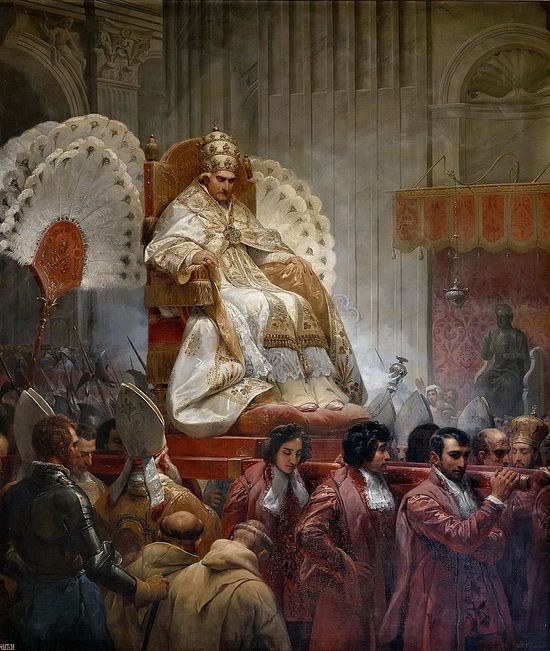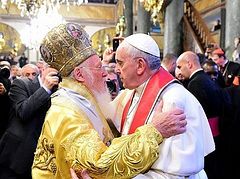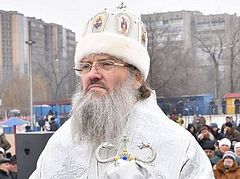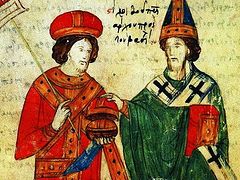 Pope Pius VIII in St. Peter's Cathedral on Sedia Gestatoria (1829). Frank Bernard Dixie
Pope Pius VIII in St. Peter's Cathedral on Sedia Gestatoria (1829). Frank Bernard Dixie
The crisis in the interrelations between Local Churches, provoked by the invasion by the Patriarchate of Constantinople of the canonical territory of the autonomous Ukrainian Orthodox Church (which is in canonical unity with the Moscow Patriarchate), exposed a problem of global scale for Orthodoxy—the Phanar’s assimilation of ecclesiology developed in the Middle Ages by the Roman Curia, but with the transfer of papal supremacy, rights, and privileges from the Old Rome to the New Rome—Istanbul.
Turning to the circumstances in which the Great Schism of 1054 took place, and to its background, one cannot but come to the conclusion that its main cause was the claims of the Bishops of Rome of lordship over the Church, and not the argument about Filioque: Eucharistic communion between the Churches of the West and the East remained for several centuries after the invention of this problematic formula, which received irrefutable criticism from the great theologian Saint Photios, and almost two centuries later this out of place addition was officially included in the Roman Creed.
And now history is repeating itself, as if in a nightmare. The watchword of the Phanar’s claims for supremacy over Universal Orthodoxy has become the formula “first without equals”—primus sine paribus. And so one of the authors writing on the topic of the status of Patriarch of Constantinople, Hieromonk Nikita Pantokratorsky, asserts that the Patriarch of New Rome is the "first without equals" to his bishops. A peculiar idea has been adapted by some of the prominent Greek theologians.
Primus inter pares
In order to more fully and more accurately understand the meaning implied in this remarkable expression, let’s turn to the sources—focus on the context in which the primus inter pares (first among equals) formula, was used in the past, as opposed to the fundamental idea of this contemporary Constantinopolitan ecclesiology.
In Ancient Rome, in the first century B.C., Gaius Julius Caesar was called the “first among equal” [citizens], when he exercised real dictatorial powers, but within the legal framework of the Republic. And then this formula was also applied to Augustus Caesar, when he acquired the position of Princeps senatus, which functionally meant “first senator”, but, broadly and figuratively, also “first citizen” [Princeps civitatis—Trans.]
And here we are; for the Patriarch of Constantinople, a similar model of relations with the episcopate and with the heads of the Local Churches turned out to be too tightly restricting for him, burdensome, and narrow. He is more comfortable with a radically different position in church hierarchy—and if analogies are given from the political structures of ancient states, then most likely, this preferred model from Constantinople’s latest point of view, [takes the form of] Pharaonic Egypt, Persia under Darius and Xerxes, and those Hellenistic monarchies in which Kings ruled over not citizens equal to them, but subjects.
The model of primus inter pares (first among equals) was until the era of absolutism, practiced in medieval Europe. This is how the relationship between the King and his vassals was characterized: Dukes, Marquises, Counts, Viscounts, who in France and England were called "peers", that is, "equal" to the king, who reigned over them only as the first among the Seigniors1.2 But for the Patriarch of Constantinople, this [first among equals] model of interrelations with other Patriarchs, to a certain extent, analogous to the relations of medieval Kings with their peers, has become too infra dignitatem [simply put: humbling—Trans.]
Servus servorum Dei
Medieval Europe knew only one monarch who was then without equals—the Pope. Patriarchs, Metropolitans, Archbishops and Bishops of the West ceased to be equal brothers to him, becoming but subjects of the “servant of the servants of God” (servus servorum Dei)3.
Now, as it has been explicitly stated and repeated many times, only this model pleases the Patriarch of New Rome. The Byzantine honorary title “Ecumenical”, which was awarded to high-ranking nobles (for example, “Ecumenical Judge”, which meant “Imperial Judge”, despite the fact that this title was often not tied to the exercise of judicial powers, akin to [the titles of] Russian officials “Privy Councillor” or “Collegiate secretary”, denoting a rank, not an indication of official duties; this can be interpreted as an accurate [analogy] describing the [actual] geographical boundaries of the jurisdiction of the Ecumenical Patriarch.4
To adopt such a model of the relationship between Local Churches, a radical revision of the very foundations of Orthodox ecclesiology would be needed. Therefore, the Orthodox Church, even in the event of the apostasy of the prominent First Hierarchs of the Local Churches, will not follow the apostates; [the church will] guard her teachings given by God, which authentically expresses Holy Tradition. According to the canons, the heads of Local Churches, no matter what place they occupy in the diptychs, are equal in powers, and a certain position in the diptychs, including the first of them, refers to honor, not to power. Moreover, sacramentally speaking, not only the Primates of Local Churches, but all Bishops in general, even those with a significant difference in their administrative status, are equal.
Primus sine paribus
Papism is not compatible with Orthodoxy. The primus sine paribus formula invented by Phanar, self-evident in its exorbitant pretensions and arrogance, is inappropriate for reasons of gospel ethics [humility], even to describe the relationship of the Bishop with the clergy of the diocese subordinate to him. The Bishop, of course, is not equal to priests and deacons, but there is no need to resort to such a provocative expression, alien to the spirit of Christian brotherhood, to characterize the canonically legitimate relationship of clergy with their ruling bishop.
The assimilation of the title primus sine paribus to the Patriarch of Constantinople already looks directly contrived in the light of the canons. None of them assigned to the Bishop of Constantinople the leading place in the diptychs, because in the era of the creation of codex of canons, this place belonged to the Bishop of (Old) Rome. In the canons (the 3rd canon of the Second Council5, and the 28th canon of the Fourth Ecumenical Council6), the throne of New Rome is not the first, but the second in the diptychs.
The 28th canon of the Fourth Ecumenical Council, referred to by apologists for the claims of the Patriarch of Constantinople to a monopoly of jurisdiction in the diaspora, refers to the territorial borders of the Patriarchate of Constantinople. The 9th and 17th rules of the same Council, as the great canonist John Zonaras explained in his time, speak of the right of the Patriarchate of Constantinople to receive appeals within the territorial boundaries of the Local Church of Constantinople established by the Council of Chalcedon [Fourth Ecumenical Council], and fixed in its 28th canon. In other words, from these three canons, not even a hint of an exceptional status for the cathedra of New Rome among other Primates can be drawn.
Only as a result of the Great Schism of 1054 did [Constantinople] take first place in the Orthodox diptychs. Were the canonical powers of the formerly primary Roman cathedra not transferred [to Constantinople] as a direct result of the fall of Rome from Orthodoxy? Yes, they have been. But these powers, according to the canons, consisted only of a primacy of honor, and not power: the canons provided the Pope and the Roman Curia neither legislative, nor administrative, nor judicial powers outside the boundaries of the Roman Patriarchate. The body of canons contains the Epistle of the African Synod to Pope Celestine, which resolutely rejects the right of the Bishop of Rome to receive appeals coming from clergymen of other Local Churches, which are not subject to the jurisdiction of the Pope:
“Premising, therefore, our due regards to you, we earnestly conjure you, that for the future you do not readily admit to a hearing persons coming hence, nor choose to receive to your communion those who have been excommunicated by us, because you, venerable Sir, will readily perceive that this has been prescribed even by the Nicene council.”7
Referring to the canons of the First Council of Nicaea, the African [Carthaginian] Fathers declare a profound ecclesiological basis for not recognizing the right of the Bishops of Rome to jurisdiction in other Local Churches:
“For [the Fathers] have ordained with great wisdom and justice, that all matters should be terminated in the places where they arise; and did not think that the grace of the Holy Spirit would be wanting to any Province, for the bishops [priests]8 of Christ (Sacerdotibus) wisely to discern, and firmly to maintain the right: especially since whosoever thinks himself wronged by any judgment may appeal to the council of his Province, or even to a General Council [i.e. of Africa] unless it be imagined that God can inspire a single individual with justice, and refuse it to an innumerable multitude of bishops9 (sacerdotum) assembled in council.”10
The Epistle goes on to say:
“For that your Holiness should send any [extra-jurisdictional judgement—Trans.] on your part we can find ordained by no council of Fathers.”11
And in the conclusion of the Epistle we find a prophetic warning, which was neglected in Rome:
“Moreover whoever desires you to delegate any of your clergy to execute your orders, do not comply, lest it seem that we are introducing the pride of secular dominion into the Church of Christ which exhibits to all that desire to see God the light of simplicity and the day of humility.”1213
These words are striking in their relevance to the development of events in the relationship between the Local Orthodox Churches at the moment. The Patriarchate of Constantinople in the past, before the ill-fated actions of Patriarch Meletius (Metaxakis), undertaken in the 20th century, (when Phanar could not resist the temptation of marauding the fruits of the bloody persecution of the Russian Church, subjugating part of its canonical territory), opposed Western Papism, and did not try to imitate it [by] claiming universal (ecumenical) jurisdiction. Thus, Patriarch Anthimus VI of Constantinople, together with the Synod of the Church of Constantinople, wrote14 to Pope Leo XII in response to his message:
“The Divine Fathers, venerating the Bishop of Rome only as the bishop of the capital city of the Empire, granted him the honorary seniority of presidency, considering him simply as the first bishop in order, that is the first among equals…not one of the Fathers have a hint of the idea that the Bishop of Rome is the single leader of the Catholic Church”
And now the successor of the cathedra of the Orthodox Patriarch Anthimus VI, and his apologists, breaking with the centuries-old tradition of their Local Church, publicly declare that there is a bishop who has no equal in the world, and this is the Patriarch of New Rome—primus sine paribus (the first without equal). When such statements sounded from the Old Rome in the Middle Ages, the bishop of that city at least possessed political power with which the secular monarchs of Catholic Europe could not compete at that time—not even the Emperor of the Holy Roman Empire of the German nation.
When the Holy Roman Emperor Henry IV entered into rivalry with Pope Gregory VII, it ended for him with the Humiliation of Canossa. The newfound candidate for unlimited power over the Church does not even possess the political power of the Pope, who humiliated the emperor. Invading the realm of worldly politics, the Popes acted as powerful sovereigns in the Middle Ages. Nowadays, the Patriarch of the New Rome took part in the unfortunate development of events in Ukraine, not at all as a sovereign, but acting as an underling, as if in service [to another power].
Papist ecclesiology in the West did not come into the world overnight; it was a culmination, the gradual development of false ideas, maturing under the influence of many different historical factors. The claims of Popes to universal jurisdiction, which had already become painful in the pontificate of Gelasius, the first of the self-proclaimed "Vicars of Christ", who assimilated to the Roman curia power to appoint and dismiss Bishops, did not receive proper criticism from Eastern theologians. Concessions to Phanar’s exorbitant appetites, which had previously been made in search of compromise, for the sake of maintaining peace in the church, did not prevent, but rather encouraged the growth of his ambitions for power. The ecclesiological doctrines reflected in the holy canons are part of Holy Tradition, they are from the field of dogma, and in matters of Faith there can be no compromise by the very nature of things.




